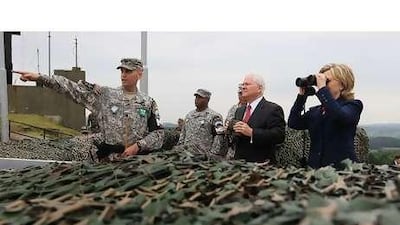The United States laid out a set of new sanctions against North Korea yesterday as punishment for torpedoing a South Korean navy ship in March. "Today, I'm announcing a series of measures to increase our ability to prevent North Korea's [nuclear] proliferation, to halt their illicit activities that helped fund their weapons programmes and to discourage further provocative actions," Hillary Clinton, the US secretary of state, told reporters in Seoul.
Mrs Clinton arrived in South Korea yesterday for unprecedented "two-plus-two" security talks, in which she and the US defence secretary, Robert Gates, met their South Korean counterparts to show support after the unprovoked naval attack, which killed 46 sailors. Their presence comes several days before a joint naval exercise in the East Sea. In a joint statement, the officials warned Pyongyang to refrain from further provocations against South Korea and stressed that "there would be serious consequences for any such irresponsible behaviour".
She also made a high-profile visit to the inter-Korean border village, Panmunjum, just across from North Korea, to display Washington's firm defence commitment to its Asian ally. "The key two points are to prevent future North Korean provocations and demonstrate a firm US-South Korea alliance to the North," said Lee Su-seok, the director of the Centre for Inter-Korean Relations Studies at the state-run Institute for National Security Strategy in Seoul.
Pyongyang has denied involvement in the sinking of the Southern Korean corvette, the Cheonan. Following the incident, South Korea took Pyongyang to the UN Security Council for punitive measures.Although the council issued a non-binding presidential statement condemning the attack, China, a council member with veto powers, had it watered down so that North Korea was not identified as the culprit and no punishment was meted out.
Pyongyang called it a "diplomatic victory". Beijing is also uneasy about a planned joint naval exercise between the United States and South Korea starting on Sunday that will involve the movement of the US nuclear-powered aircraft carrier George Washington near China's waters. Its foreign ministry expressed "resolute opposition". Speculation has risen that Seoul and Washington made a compromise over the scheduled exercises because of Beijing's opposition, which will place the George Washington in the East Sea, not in the Yellow Sea as originally planned.
"If the participation of a US carrier in the Yellow Sea drill was called off [because of China's opposition], that would set a bad precedent," said Tetsuo Kotani, a security expert at the Ocean Policy Research Foundation in Tokyo. "The credibility of the US will be undermined." Mr Lee in Seoul said: "The goal of the drills is against North Korea. The US and South Korea don't find a reason to antagonise China, especially when it has been reacting so sensitively on the matter."
A former senior Chinese foreign ministry official, requesting anonymity, said in an interview that China had two main concerns over the naval exercises. "The exercises involve sophisticated US equipments that would come closer to China's core security areas. Some of the weapons' coverage can reach Beijing. China is concerned about its core security exposed." He also said the Chinese government's reaction reflected the anger of the public who still remember the "humiliating historical memory 100 years ago in the Yellow Sea", which the western powers and Japan used to reach mainland China.
Beijing is also worried about the possibility that the exercises could spill into a military collision with North Korea, he said. After the reported change of the venue for the manoeuvres, China's state-controlled media outlets toned down their harsh reactions. "The US and South Korea have taken our feelings into account this time," the official China Daily yesterday quoted Li Qinggong, the deputy secretary general of the China Council for National Security Policy Studies, as saying.
Yesterday's joint statement from the US and South Korea, however, does not exclude the Yellow Sea in future drills. It said the two countries would conduct a series of joint military exercises over the coming months in South Korea and "off the east and west coasts of the Korean Peninsula". After the UN statement, North Korea expressed its willingness to return to the stalled six-party nuclear disarmament talks, an apparent sign of its wish to "turn the page" after the Cheonan incident, which further tarnished its international image.
Mrs Clinton said resuming the nuclear talks "is not something we're looking at yet". She said the North should first take responsibility for the ship sinking and demonstrate sincere willingness to dismantle its nuclear programme. "But to date, we have seen nothing." @Email:sleethenational@gmail.com

